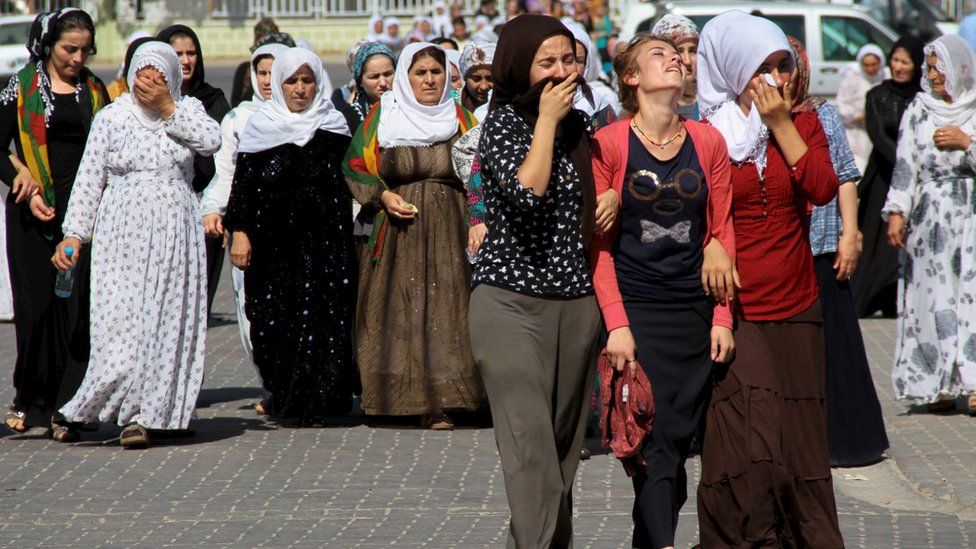Turkey PKK conflict: Turks question explosion in tensions
- Published

For journalists, local or foreign, reporting from the south-east of Turkey has always been a challenge.
But now, with the ceasefire between Turkey and Kurdish PKK militants at an end, violence has returned to the region and tensions are high.
Not a day passes without news of a clash, a bombing, a mine explosion or a funeral.
The area has been blighted by decades of violence. Clashes between security forces and the PKK (Kurdistan Workers' Party) have claimed more than 40,000 lives.
Journalists reporting on the "Kurdish problem" - especially during the most violent years of the 1990s - were frequently subject to detention, occasionally ending with imprisonment.
There was a reminder of this when two British journalists working for US-based Vice News and their translator were arrested this week while filming in the predominantly Kurdish town of Diyarbakır.
Vice News is adamant they were covering the renewed hostilities in the area. But they have been charged with "working on behalf of a terrorist organisation".
Some journalists based in Turkey took this as a "warning". One Turkish reporter tweeted: "President [Recep Tayyip] Erdogan is giving us a message. He says, if we can do this to foreign journalists, imagine what we can do to you."
'Who murdered him?'
"Martyrs do not die. The country will not be divided!" is a chant frequently heard at funerals, in solidarity with the deceased soldiers or policemen - now numbering more than 60.
But when a grief-stricken army officer spoke out in front of the cameras last week, everyone was taken by surprise.
At his younger brother's funeral, Lt Col Mehmet Alkan asked: "Who is his murderer? Who caused this?"
Hugging his brother's coffin and unable to control his emotions, he yelled: "How come those who have been speaking about peace now speak only of war?"
This was an upfront criticism of the shift in Turkish government's policy towards the PKK.
Coming from an army officer, it carried even further significance.
For years, Turkey conducted indirect peace talks with imprisoned PKK leader Abdullah Ocalan. A clear fruit of this process was the ceasefire that came into effect in 2013.
Now, as one flag-draped coffin follows another into the ground, relatives of the deceased have started questioning the government's decision to abandon the process.
There is now a military investigation into Lt Col Alkan's comments. But his outburst was not a one-off.
At other funerals, government ministers have had to bolt from the scene - even at the cost of cutting ceremonies short - because of protests.
Trouble ahead?
The government says military operations against the PKK will continue until the group withdraws from Turkish soil and disarms.
A scheme to place a bounty of up to 4m Turkish lira (£900,000; $1.4m) on the heads of high-ranking PKK militants is planned.
Curfews have been imposed in several towns where clashes take place and over a hundred districts have been declared "temporary security zones".
In retaliation, several municipalities in the predominantly Kurdish east and south-east of Turkey have announced "self-rule".
Critics accuse President Erdogan of renewing violence to curb the support for the pro-Kurdish People's Democratic Party (HDP), whose 14% share of the vote in June elections cost the governing AKP its majority in parliament.
The government denies these accusations.
Since June, it has been unable to find a coalition partner and snap elections are to be held in November.
As neither the government nor the PKK show any signs of scaling down the violence, many people fear the clashes will mount as polls draw closer.
- Published13 August 2015
- Published23 August 2016
- Published15 October 2019